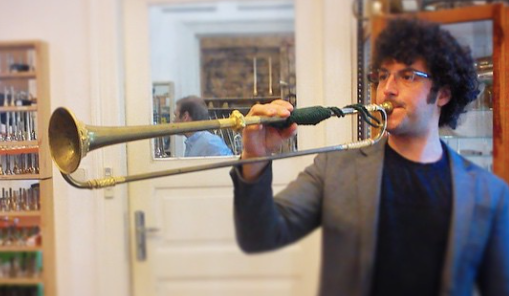This post can now be found HERE:
http://trumpetchrisblog.com/apps-for-musicians/
1. forScore (paid app)
More and more musicians are using their computers and iPads to read sheet music. Sure, nothing beats the real thing, but nothing beats ForScore for organizing your performances and practice sessions. This app allows you to organize pages from multiple files into set lists so you don’t have to flip through millions of pages to find that one etude you’re looking for.
Additional features include:
-
Built-in Metronome. VERY useful in rehearsals and practice sessions.
-
Half-Page Turns. this option (turn pages without missing a beat!)
-
Integrated Music Player. link music files on your iPad/iPhone/etc. to the score so you can practice with a recording!
-
Cloud Services. Link your DropBox, Google Docs etc. account and load files directly to your device from the cloud OR directly from your computer via iTunes
2. Waze (free!)
Most musicians drive to gigs/school, etc. Do you currently use Google Maps, Apple Maps? Here’s why you should switch to Waze:
-
quicker routes. many drivers report traffic data to be more accurate on Waze than google maps (Google maps actually gets some of it’s traffic data from Waze users–why not get it from the source?!)
-
Police Reporting. I can’t recommend speeding. But if you must, avoid tickets by getting live police reports from other Waze users!
-
More live reports. Pot holes, traffic cameras, stopped cars–these obstacles are all reported by other Waze users. The data is out there–take advantage of it!
3. Dropbox (free! with paid upgrade option)
If you are a musician and don’t use Dropbox, I am not sure how you do it. Dropbox gives you a huge amount of digital storage — perfect for sheet music, photos/videos, recordings, etc. –that you can access everywhere. The day I got Dropbox wa step day I stopped lugging around my computer on tour.
4. Google Docs (free!)
Another great cloud service. Google Docs allows you to store files just like Dropbox but also give you free access to their own web version of Word (Docs), Excel (Sheets), and a whole slew of other products comparable to Microsoft’s original suite (all free!).
5. Evernote (free! with paid upgrade option)
Yes, Evernote is a cloud service. Why am I recommending 3? They are all different. Evernote is unique in that you can scan PDF’s and the are all text searchable. Tired of signing Multiple W-9 forms? Sign and scan ONE W-9 and save it in Evernote. Even if you have horrible online organizational skills, simply searching for W-9 will pull it up–even if it’s not in the file name. Very useful!
6. Genius Scan (free version available)
Smart phones take great pictures. Why is Genius Scan better than your built-in camera app? Genius Scan recognizes a black and white scan vs. color and enhances it accordingly. I scan all of my documents with this app, even when I’m home. I don’t even own a scanner!
7. Tonal Energy – Tuner App (paid app)
There are many great tuner apps out there but Tonal Energy is different. Here’s why:
-
intuitive tuner screen (tells you if you are sharp or flat and how much in numerical values as well as visually)
-
fantastic oscilloscope visualizes sound with amazing accuracy. Some musical concepts are difficult to explain in words but easy to understand when visualized. For example: students tend to understand how to slur properly when looking at the oscilloscope — it becomes more apparent that they aren’t using their air properly because they can literally SEE the dip in their sound. A very cool tool!






You must be logged in to post a comment.